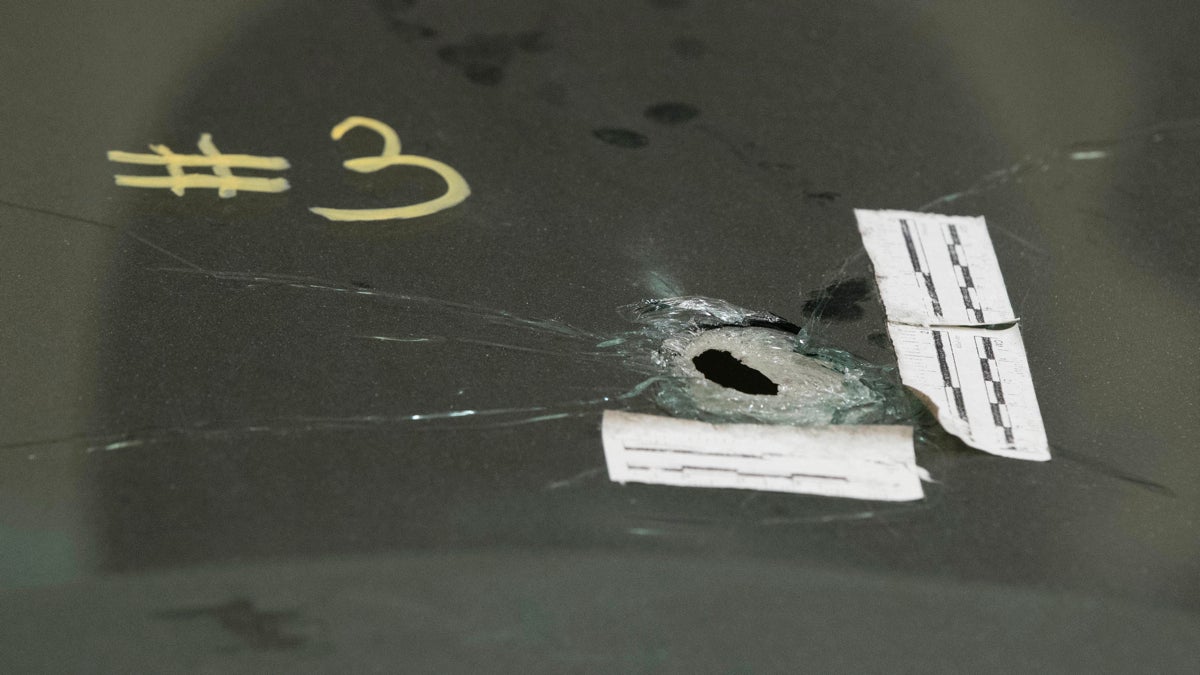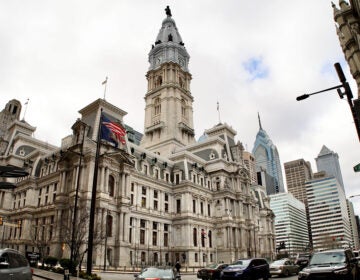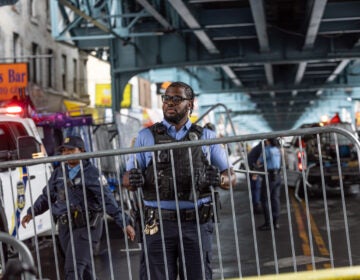Philly DA candidates may find quest for accountability in police shootings proves elusive
Listen
Shown is a bullet hole in Philippe Holland's windshield in Philadelphia Jan. 6. Holland, a pizza deliveryman, shot and injured when plainclothes police fired 14 times at his car has negotiated a $4.4 million settlement with the city of Philadelphia. (AP Photo/Matt Rourke)
Over the last decade, Philadelphia police officers have fired their weapons at civilians 435 times, according to department statistics. And, in 103 of those instances, the bullets proved deadly.
But the number of on-duty officers who have been charged by the city district attorney’s office? Zero.
“It seems hard to believe that you have 430 shootings, where every one of them was truly justified under the law, that nowhere in there is there a manslaughter or murder charge. But that’s the norm,” said Philip Stinson, a Bowling Green State University criminologist who studies police shootings.
On-duty officers shoot and kill an estimated 1,000 people a year nationwide, yet from 2005 to 2014, just about five officers each year faced criminal charges for the use of lethal force.
It is a norm that all of the candidates vying to be Philadelphia’s next top prosecutor say they are aiming to reverse locally. Most of the eight candidates say police reform and accountability is a priority, though experts say change may be hard to initiate.
Recently, Stinson met with a group of district attorneys who gathered in Atlanta to talk about issues including holding police who fire their weapons accountable. A consensus is emerging among city prosecutors that not all police shootings can possibly be justified, he said.
At many offices around the country, district attorneys are “figuring out better ways of handling these cases to make sure they’re properly investigated. That charges are brought when they’re appropriate,” Stinson said. “And that the politics of it all don’t just result in it just being swept under the rug.”
Whoever becomes the city’s next DA will be confronted with many obstacles to holding police accountable for firing their weapons, Stinson said. That list includes figuring out a way to independently investigate police shootings; overcoming resistance from the politically powerful Fraternal Order of Police Lodge 5; and convincing grand juries to charge.
Historically, he said, they haven’t succeeded in those tasks, perhaps due to a mix of sympathy for police officers as well as prosecutors not putting forth enough evidence to establish probable cause.
What’s more, prosecutors say winning a conviction against a cop would require proving that at the time of the shooting, the victim was not a threat to the officer or any other civilians. When the victim is armed, establishing a convincing case against an officer becomes even harder.
FOP officials never returned calls seeking comment for this report.
Lawyer Tom Kline, who has had high-profile clients who were shot by police, said policing the police should be an urgent topic for the next DA.
“This is a public trust and a public confidence issue. There is a need for the public to feel safe. Not only safe from criminals, but safe from police,” Kline said.
Not turning a blind eye, DA’s office says
Kathleen Martin, first assistant in the Philadelphia district attorney’s office, disagreed with the premise advanced by activists that the office allows officers to commit crimes with impunity.
The office “does not turn a blind eye to the criminal acts of any citizen, police or not,” Martin said.
She mentioned five officers who have been charged with crimes by prosecutors, though all were off duty at the time of the incidents.
No officer has been charged since 2007 who fired in the line of duty.
Kline said the public should be outraged by that.
“And every time one of these things are videotaped, or seen, or witnessed by credible witnesses, the public rallies to the same conclusion, which is: It shouldn’t happen,” Kline said. “And that’s because we all fundamentally understand we don’t want it to happen to us.”
He said if prosecutors can’t clear the bar to charge an officer, police bosses can fire officers who engaged in misconduct. But, Kline said, more often than not officers are more likely to be reassigned then let go from the department.
Stinson described a hypothetical police shooting that may sound all too familiar in the city.
“It was completely inappropriate and against the department’s policies, and it was unnecessary because there were other avenues that could be taken. And yet the officer was legally justified,” he said. “Try to explain that to the general public.”
WHYY is your source for fact-based, in-depth journalism and information. As a nonprofit organization, we rely on financial support from readers like you. Please give today.




